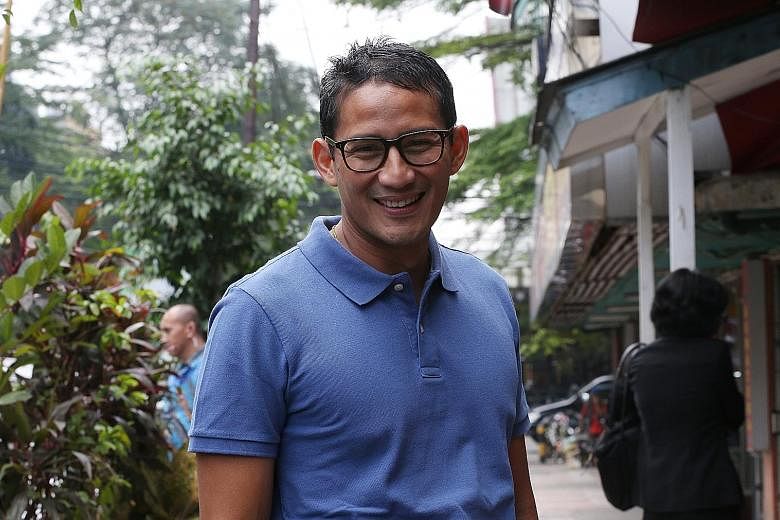Former businessman Sandiaga Uno has been described as a reluctant politician, and few would blame him for being one after seeing his first sample polling numbers.
"Out of 100 people, only eight recognised my name and of that, four recognised my face; and out of the four, only two really knew who I am and what I do. It was almost sad," he recounted with a laugh.
But that survey was over a year ago, when he had just thrown his hat in the ring to challenge Basuki Tjahaja Purnama, whom he describes as Jakarta's "rock-star governor", at the gubernatorial election.
Last month, he and former culture and education minister Anies Baswedan defeated Basuki and his deputy Djarot Saiful Hidayat, in what was widely regarded as a divisive election.
It was a resounding victory for the Anies-Sandiaga team, who won the race by 16 percentage points.
But it was an ugly contest, bookended by Basuki being accused of insulting Islam, and later jailed two years for blasphemy.
A string of street rallies since late last year organised by Muslim hardline groups against Basuki had also tested Indonesia's racial and religious tolerance.
Mr Sandiaga, 47, however, said it is now time for reconciliation, and for him and Mr Anies to start fulfilling their campaign promises to the people of Jakarta.
"It is unfortunate that the campaign got hijacked by issues of race and religion," he told The Straits Times during an interview at his campaign headquarters in South Jakarta earlier this month.
He is fully aware that as deputy governor-elect and governor-elect respectively, he and Mr Anies now have the major task of convincing people in Jakarta that the new City Hall will work for all of them.
"We must ensure we maintain our campaign pledge. We need to make sure that we are leaders for everyone - not just for the 3.2 million who voted for us, but also for the 2.3 million who voted for Basuki," he said.
His easy smile belies a steely-eyed determination when he speaks about his plans, which are centred on creating quality jobs, good education and affordable cost of living.
He also maintained that although he will be deputy governor, he and Mr Anies will lead the capital together as "a two-in-one package" once they take office in October.
"Anies will oversee institution building and human capacity development, while I will take care of the economy and infrastructure," he added. "I am not going to be an also-ran sort of deputy governor."
His former business associates such as chief executive Tan Chin Hwee said Jakarta is in good hands with Mr Sandiaga, describing him as a "savvy investor and a patient business builder".
That Mr Sandiaga is business-like is no surprise, especially since he was ranked the 47th richest man in Indonesia by Forbes magazine in 2013. But his immense wealth has also attracted controversy.
Last year, he had to publicly deny any wrongdoing when his name appeared in the Panama Papers, which detailed the offshore tax havens of the ultra rich.
He was also questioned last Tuesday by graft investigators over the procurement of medical devices at a university and the construction of an athletes' dormitory in Palembang - allegations he has denied.
Before Mr Sandiaga entered politics full-time last year, he stepped down from all 18 companies he was associated with.
But the Wichita State University graduate admits he was initially averse to politics.
He had rejected at least two major political parties before finally agreeing to join Gerindra last year.
"I had believed that politics was always associated with nasty and divisive rhetoric," he said.
But sometime in 2015, Gerindra chief Prabowo Subianto told him that it was time for him to serve his country. "He said 'If you are in politics and shaping policies, you could affect millions, if not tens of millions', and that intrigued me," said Mr Sandiaga.
But the father of three let on that he also had a nudge from his mother Rachmini Rachman.
"Pak Prabowo approached my mother," he said. "So my mother convinced me that I should do it and that was how this all started."
Asked about the perceived rise of intolerance in Jakarta, Mr Sandiaga said the capital is "not going radical" and will remain open for business to foreign investors.
"Jakarta is not putting hardline Islamic ordinance into the city; we love the city," he said.
Gesturing at the scene outside his window, he added: "There is Little Tokyo here and they sell good sake but with proper licences, so life will continue as normal."

